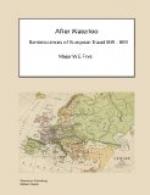I did not visit the churches and palaces in this city from not having time and, besides, I did not feel myself inclined or bound (as some travellers think themselves) to visit every church and every town in Italy. I really believe the ciceroni think that we Ultramontani live in mud hovels in our own country, and that we have never seen a stone edifice, till our arrival in Italy, for every town house which is not a shop is termed a palazzo, and they would conduct you to see all of them if you would be guided by them. I had an opportunity, during the two hours we halted here, of walking over the greater part of the city, after a hasty breakfast. Piacenza is a large handsome city; among the females that I saw in the streets the Spanish costume seems very prevalent, no doubt from being so long governed by a Spanish family.
On leaving Piacenza we passed thro’ a rich meadow country and met with an immense quantity of cattle grazing. The road is a fine broad chaussee considerably elevated above the level of the fields and is lined with poplars. Where this land is not in pasture, cornfields and mulberry trees, with vines in festoons, vary the landscape, which is additionally enlivened by frequent maisons de plaisance and excellently built farmhouses. We passed thro’ Firenzuola, a long well-built village, or rather bourg, and we brought to the night at Borgo San Donino. At this place I found the first bad inn I have met with in Italy, that is, the house, tho’ large, was so out of repair as to be almost a masure; we however met with tolerably good fare for supper. We fell in with a traveller at Borgo San Donino, who related to us an account of an extraordinary robbery that had been committed a few months before near this place, in which the then host was implicated, or rather was the author and planner of the robbery. It happened as follows. A Swiss merchant, one of those men who cannot keep their own counsel, a bavard in short, was travelling from Milan to Bologna with his cabriolet, horse and a large portmanteau. He put up at this inn. At supper he entered into conversation with mine host, and asked if there was any danger of robbers on the road, for that he should be sorry (he said) to fall into their hands, inasmuch as he had with him in his portmanteau 24,000 franks in gold and several valuable articles of jewellery. Mine host assured him that there was not the slightest danger. The merchant went to bed, directing that he should be awakened at daybreak in order to proceed on his journey. Mine host, however, took care to have him called full an hour and half before daybreak, assuring him that light would soon dawn. The merchant set out, but he had hardly journeyed two miles when a shot from behind a hedge by the road side brought his horse to the ground. Four men in masks rushed up, seized him and bound him to a tree; they then rifled his portmanteau, took out his money and jewels and wished him good morning.




